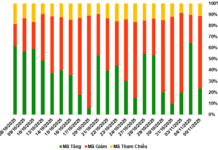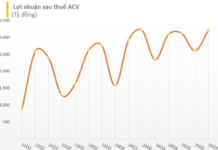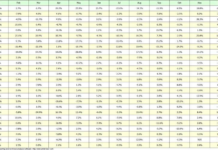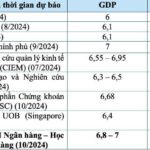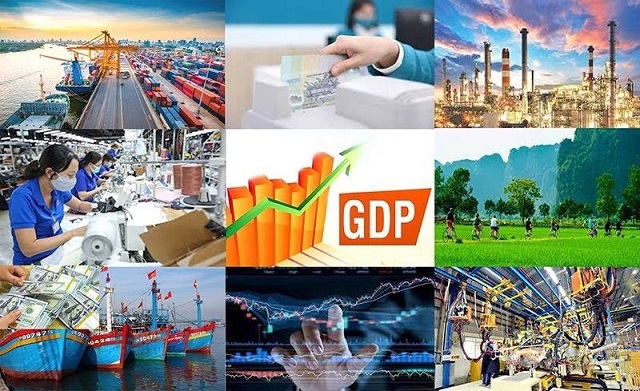
For 2025, the target is set to maintain the consumer price index (CPI) growth rate at around 4.5%.
|
The general objective for 2025 is to accelerate, break through, and achieve the highest possible results in the socio-economic development plan for the 2021-2025 period. This involves continuing to prioritize growth while maintaining macroeconomic stability, controlling inflation, and ensuring the economy’s major balances. There will be an even stronger focus on refining and completing the legal system, resolving lingering institutional issues, and removing obstacles to innovative development and national breakthroughs in the new situation.
Substantive and effective restructuring of sectors and fields will be carried out in conjunction with a shift in the growth model. This will enhance productivity, quality, resilience, and the economy’s competitiveness. We will also expedite the construction of strategic and important national infrastructure projects, ensuring their early completion and efficient operation. Emphasis will be placed on developing high-quality human resources, particularly for priority and emerging sectors, and vigorously promoting science and technology, innovation, digital transformation, green economy, digital economy, and circular economy, while ensuring security and safety to foster development.
Cultural and social development will be closely and harmoniously linked to economic growth, ensuring social security, improving social welfare, and enhancing people’s lives. Administrative procedures will be further streamlined, and the business environment will be improved. Substantial and effective decentralization and empowerment will be strengthened, and the organizational apparatus will be streamlined to enhance efficiency and effectiveness. Discipline and order will be tightened, and the responsibility of leaders will be emphasized. We will resolutely and persistently fight against corruption, waste, and negative phenomena, not as a hindrance but as a means to promote socio-economic development, without criminalizing economic and civil relations. We will also promote thrift and combat wastefulness.
Policy communication, information, and propaganda will be improved with a positive spirit to dispel negativity, enhance the effectiveness of civic work, and create social consensus. National defense and security will be consolidated and strengthened to firmly protect independence and sovereignty, maintain political security, and ensure social order and safety. International relations and integration will be promoted, and Vietnam’s prestige and position in the international arena will be enhanced.
15 Key Targets for 2025
1. Total social product (GDP) growth rate of approximately 6.5 – 7.0%, with an aspiration of 7.0 – 7.5%.
2. Per capita GDP reaches approximately US$4,900.
3. The proportion of processing and manufacturing industry in GDP reaches about 24.1%.
4. Consumer Price Index (CPI) growth rate maintained at around 4.5%.
5. Social labor productivity growth rate of about 5.3 – 5.4%.
6. The proportion of agricultural labor in the total social labor force is 25 – 26%.
7. The rate of trained laborers reaches about 70%, including those with degrees or certificates at about 29 – 29.5%.
8. Unemployment rate in urban areas is below 4%.
9. Poverty rate (according to multidimensional poverty standards) reduced by about 0.8 – 1%.
10. The number of doctors per 10,000 people reaches about 15.
11. The number of hospital beds per 10,000 people reaches 34.5.
12. Health insurance coverage reaches 95.15%.
13. The rate of communes meeting the new rural standards is about 80.5 – 81.5%.
14. The rate of collection and treatment of urban solid waste meeting standards and norms reaches 95%.
15. The rate of industrial parks and export processing zones with centralized wastewater treatment systems meeting environmental standards is 92%.
9 Main Tasks and Solutions
To achieve these targets and objectives, the National Assembly requests the Government and related agencies to effectively implement the following main tasks and solutions:
First, take strong and drastic measures to remove institutional bottlenecks and overcome obstacles. Continue to review, supplement, and perfect the legal system, policies, mechanisms, and laws, focusing on reducing and simplifying administrative procedures and business conditions to facilitate and reduce costs for people and businesses.
Second, prioritize economic growth and support production and business while maintaining macroeconomic stability, controlling inflation, and ensuring the economy’s major balances.
Third, strengthen decentralization and empowerment for localities, enhance the responsibility of leaders, and intensify the prevention and combat of corruption, wastefulness, negativity, and vested interests. Tighten administrative discipline and order, and combine them with inspection, supervision, power control, and resource allocation to improve implementation capacity.
Fourth, concentrate resources, especially financial resources, to complete the synchronous and modern strategic infrastructure system, giving priority to key transport infrastructure projects, important national projects, the high-speed road and railway systems, inter-regional projects, and large urban infrastructure, as well as infrastructure for digital transformation. Connect the high-speed road system with airports and seaports, and implement the high-speed railway and urban railway systems.
Fifth, focus on restructuring sectors, fields, and within industries, linking it with a shift in the growth model towards stronger application of science and technology, innovation, improved productivity, quality, efficiency, competitiveness, autonomy, adaptability, and resilience.
Sixth, pay attention to developing high-quality human resources, promoting scientific research, technology development and application, and encouraging innovation and entrepreneurship.
Seventh, achieve social progress and fairness, improve people’s material and spiritual lives and health, and invest in the development of the cultural industry.
Eighth, proactively respond to climate change, prevent and control natural disasters, effectively manage resources, and protect the environment. Harmoniously balance economic development and environmental protection.
Ninth, strengthen regional linkages and effectively implement national, regional, and provincial planning. Accelerate the pace and improve the quality of urbanization and urban economy.
The Yearly Inflation Forecast for 2024: A Modest Rise of 4%
Inflation forecasts for 2024 are estimated to reach 4 to 4.5%, surpassing 2023 levels due to the significant surge in global energy and food prices. This projection underscores the critical need for businesses and consumers alike to brace for a potentially challenging economic landscape in the coming year. With inflationary pressures showing no signs of abating, proactive strategies and adaptive approaches will be essential to navigate the financial climate ahead.
The Government Directs the State Bank of Vietnam to Finalise the Plan for SCB’s Resolution by December
The government has instructed the State Bank of Vietnam to promptly finalize and submit to the competent authority a proposal for the mandatory transfer of the remaining banks under special control. They have also been tasked with finalizing a handling plan for the Saigon Commercial Joint Stock Bank (SCB) by December 2024.
The Art of Efficiency: Avoiding the Pitfalls of Ineffective Project Extensions
The Chairman of the People’s Committee of Hai Duong Province has instructed the provincial industrial zone management board to collaborate with relevant departments to review and expedite delayed projects. For projects that are significantly behind schedule, the management board must report to the provincial People’s Committee and propose effective solutions to overcome the delays, avoiding repeated extensions without tangible results.
The Data Law: A Vital Enabler of the Digital Economy
In Vietnam’s accelerating digital transformation journey, the development and enactment of the Data Law is a crucial step towards establishing a robust legal framework for data governance and exploitation. The draft Data Law is currently under discussion, and if passed, it will have far-reaching implications for various sectors, especially national digital transformation, the digital economy, and digital society.


